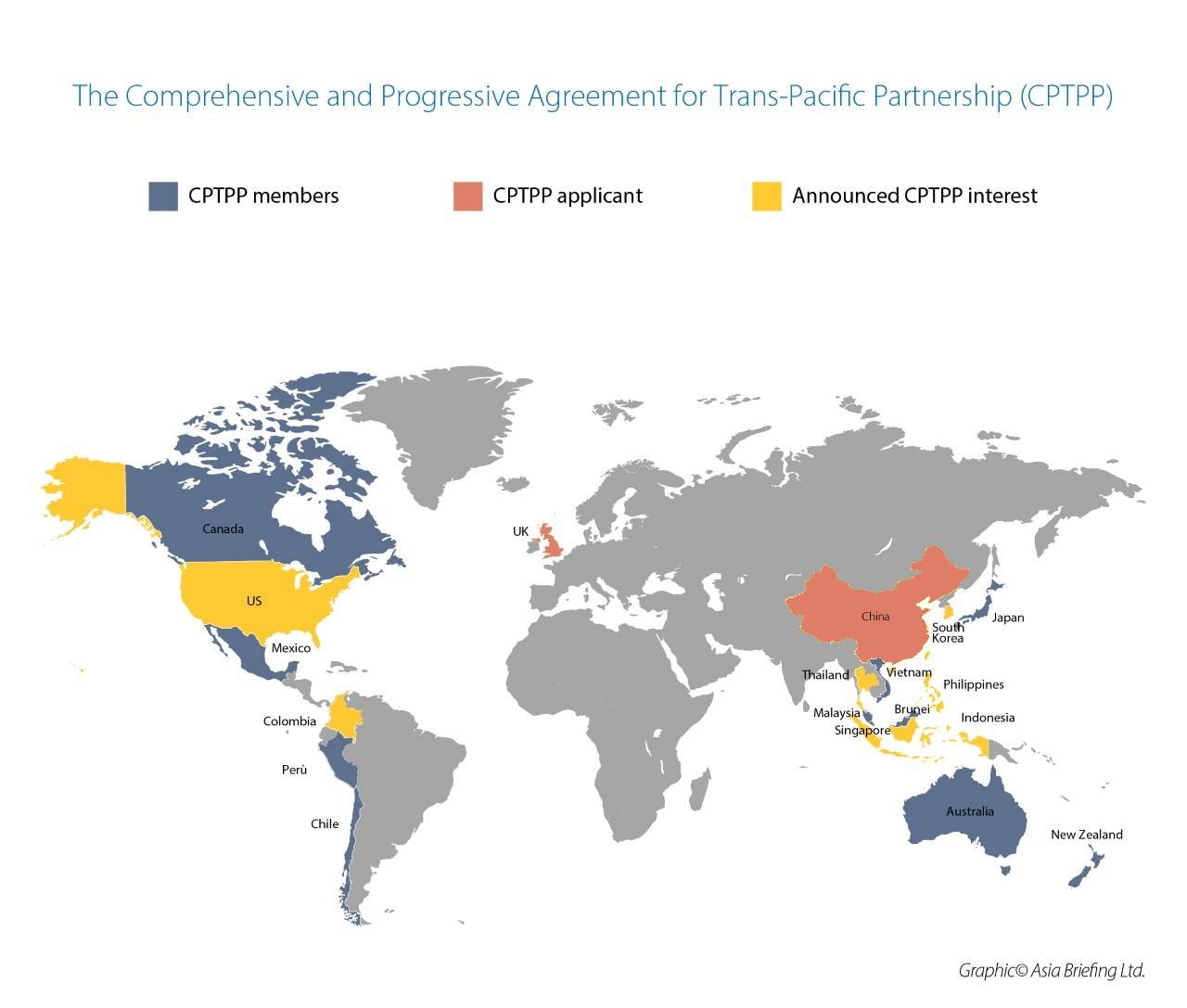China Submits CPTPP Free Trade Application
China pushes for Asia-Pacific trade, showing interest in joining CPTPP. After AUKUS engagement, the UK’s intentions towards CPTPP adds an interesting component.
By Chris Devonshire-Ellis
China’s Ministry of Commerce announced on Thursday (September 16) that it has applied to join the Comprehensive and Progressive Agreement for Trans-Pacific Partnership (CPTPP). The grouping is essentially an Asia-Pacific trade alliance, and includes Japan, Brunei, Malaysia, Singapore, and Vietnam in Asia, Australia and New Zealand in the Pacific, Canada and Mexico in North America together with Chile and Peru in South America. The UK has also applied to join, which given the current state of UK-China trade and a strained diplomatic relationship, could add some vim to revitalizing trade ties.
The CPTPP, which entered into force in December 2018, and represents about 13.5 percent of global GDP, has been talked up as the ‘gold standard’ of free trade agreements (FTAs) due to its modern trade provisions and ambitious scope.
China submitted its application to the government of New Zealand, which handles various administrative functions pertaining to the CPTPP, including new applicants. Beijing had long held interest in joining the CPTPP after the United States withdrew from negotiations during the Trump administration; previously, under the Obama administration when the US was a member, the treaty was called the Trans-Pacific Partnership. The TPP was intended to raise standards within the original bloc of nations and reduce their collective reliance on China for trade. (Trump’s decision to pull out ironically opened the door to China, as the biggest partner to all its Asia-Pacific neighbors, to strengthen trade partnerships and accelerate progress in actualizing the Regional Comprehensive Economic Partnership (RCEP), set to be among the most important regional trading blocs.)

While the RCEP agreement is also an Asia-Pacific arrangement, it mainly builds upon existing trade treaty linkages. The CPTPP has wider Asia-Pacific implications. However, for China, the CPTPP demands compliance to a range of standards for trade, and crucially, labor rights, to which Beijing would need to adapt. China has in recent time come under more human rights compliance scrutiny, such as over Xinjiang, from Western countries though not necessarily from Middle Eastern or Central Asian states.
Interestingly, the UK, should it join the CPTPP, will be, after Japan, the second biggest economy in this grouping, and third, should China join. If the UK can work out how to contribute to a process that moves China into higher standards of trade and labor rights, then the idea of a “global Britain” and working with, rather than against China, may usher in a better era of UK-China bilateral ties. That may result in the UK being a ‘testing ground’ for US policies and trade development to China before Washington enactment – an interesting proposition.
Related Reading
China Briefing is written and produced by Dezan Shira & Associates. The practice assists foreign investors into China and has done so since 1992 through offices in Beijing, Tianjin, Dalian, Qingdao, Shanghai, Hangzhou, Ningbo, Suzhou, Guangzhou, Dongguan, Zhongshan, Shenzhen, and Hong Kong. Please contact the firm for assistance in China at china@dezshira.com.
Dezan Shira & Associates has offices in Vietnam, Indonesia, Singapore, United States, Germany, Italy, India, and Russia, in addition to our trade research facilities along the Belt & Road Initiative. We also have partner firms assisting foreign investors in The Philippines, Malaysia, Thailand, Bangladesh.
- Previous Article EU-China Comprehensive Investment Agreement
- Next Article Belt and Road Investor Intelligence #47








